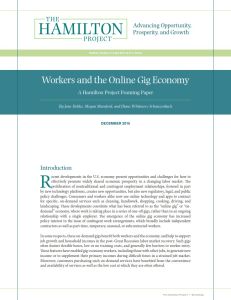
Workers and the Online Gig Economy
A Hamilton Project Framing Paper
Recommendation
What effect will the continued expansion of a digital, on-demand “gig” economy have upon employment and government regulation? In this succinct, well-researched article, Diane Whitmore Schanzenbach, Jane Dokko and Megan Mumford of The Hamilton Project explore why contingent labor is on the rise in the United States. They dissect concerns for worker welfare, and look at the reasons why more up-to-date and nuanced regulation is necessary to safeguard both workers and employers. getAbstract recommends this evaluation to policy makers, business owners and those employed in the gig economy.
Summary
About the Authors
Diane Whitmore Schanzenbach is director, Jane Dokko is policy director and Megan Mumford is a research assistant at The Hamilton Project, which drafts policy proposals on improving the US economy.








Comment on this summary